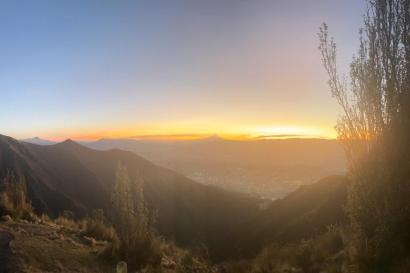When I first investigated studying abroad, I had two goals in mind: improving my French and homing in on my environmental science skills. While I’m not majoring or minoring in French, learning it has been a fun hobby of mine and I was ready to take it to the next level by studying abroad. However, after looking into the available options, I realized that it would be pretty difficult to find an environmental program in a francophone country. Nothing quite fit the bill. And so… alas... it appeared I would have to make a choice: French or Environmental Science.
Fortunately, the decision was made for me. I realized that if I wanted to graduate on time, I would have to focus on my environmental classes. This quickly narrowed the available options and after a little research I found the IES Abroad Galápagos Islands program. It immediately caught my eye. When else would I get the chance to live on the Galápagos for three months? And while studying such unique plants and animals? There was only one concern: I didn’t know a lick of Spanish.
Oh well.
I guess life was giving me the perfect opportunity to pick up a new skill: hablando en español.
So, I made the leap. I decided to fly to a country where I knew nada, nunca, zip, zero, nothing of the native language. After a month of living here, I can say this: it’s been a crazy quick learning curve. There have been a good many mistakes, confused looks and bouts of nervous laughter. Some of my most common phrases include “Cómo se dice ___ en español” and “Qué significa ___.” But despite my extremely basic knowledge, I am inching my way towards conversational Spanish. Every day I am becoming more capable of talking with the people around me. Each newly-learned phrase gets me closer to making a friend at the park or successfully asking directions to the nearest shoe store.
If you are in the same boat as me (embarking into the unknown territory of a new language), here are some helpful tips:
- Get the Google translate app and download the language you need. Downloading the app lets you translate when you’re offline, which comes in handy when you don’t have good signal (like in the Galápagos).
- Start practicing vocabulary before you leave. The second I knew I was going to the Galápagos, I started looking up basic Spanish vocabulary and grammar. It kickstarted my progress and gave me a good groundwork of phrases I could start using on day one. Also, utilize the Rosetta Stone subscription that IES Abroad provides! It was a super helpful tool for me.
- Once you arrive, find a language partner of a similar skill level. While it can be easier to talk to people who are fluent in English, I’ve found that it doesn’t force you to practice Spanish nearly as much. Talking to someone who has a similar, low-level of language forces you to take your time and work with the vocabulary you have. I’ve learned the most from conversations like these!
- Read easy Spanish news articles in your free time. I’ve found that this is a great place to learn connecting or filler words. There are so many beginner language websites to choose from, I’m sure you could find articles in your area of interest!
- Learn how to talk about your favorite hobby. For me, this was soccer. Learning this kind of vocabulary has been so helpful for playing pickup soccer games and making connections with locals.
- Don’t be afraid to laugh at yourself! Everyone makes mistakes when they’re learning, and you won’t be the exception! The quickest way to learn is to jump in and start speaking.

Catherine Putzier
Hello everyone! My name is Catherine Putzier and I’m a senior at the University of St. Thomas (Minnesota), where I am studying Environmental Science with a concentration in Biology. While on my home turf, you can find me rock climbing at a local crag, playing a game of pickup soccer, or gushing about my three adorable nephews and one adorable niece. I love a good adventure and can’t wait to share about the Galapagos semester program!










